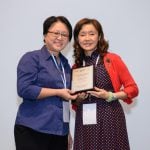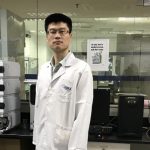Three final-year IMU Biomedical Science students, Po Qhuan, Rachana and Suodha were given the opportunity to undergo their Phase I internship at Ulster University in captivating Northern Ireland for 9 weeks from December 2019 to February 2020. Ulster University is a well-established institute, one of the top five UK universities for Biomedical Science research. Po Qhuan and Rachana were assigned to work with the Diabetes Research Group at Coleraine campus whereas Suodha worked with the Glaucoma group at Altnagelvin Hospital in Londonderry.
| Po Qhuan and Rachana’s experience at the Diabetes Research Group, Coleraine campus |
|---|
| Po Qhuan and Rachana’s on-site supervisor, Dr Yasser Abdel-Wahab, had given each of them a small-scale research project entitled “Antidiabetic Properties of Methanol Extract Murraya Koenigii and Cinnamomum Verum in the Treatment of Type 2 Diabetes Mellitus”. Under his PhD student’s guidance, they were able to receive hands-on training and essential skill development required to carry out the experiments related to the project such as glucose diffusion, starch digestion, Dipeptidyl Peptidase IV (DPP-IV) enzyme activity, protein glycation and culturing insulin-secreting cell line known as BRIN-BD11. |
| Suodha’s Placement at Altnagelvin Hospital in Londonderry |
|---|
| Suodha’s research project focused on stratified medicine which is identifying specific groups of people with distinct mechanisms of disease and particular responses to treatments. During her placement, she worked with Dr Sarah Atkinson who was doing an on-going research on glaucoma and prostaglandin analogues. For this project, most of the laboratory skills that she had to be involved in were molecular biology techniques including, cell culture, ribonucleic acid (RNA) extraction, complementary deoxyribonucleic acid (cDNA) synthesis, polymerase chain reaction (PCR) and reverse transcription (RT)-PCR. |


 The students were grateful for the laboratory knowledge and the various skills acquired from the practical sessions at the IMU throughout the semesters, as well as from their individual final year projects. These skills were further polished and advanced during the internship as they were challenged to conduct the experiments independently in the laboratory. Besides developing new laboratory techniques, Po Qhuan and Rachana also had the opportunity to befriend the PhD students in the diabetes research group, who encouraged them to shadow their experiments. In addition, it was also a privilege for them to attend a talk, “Anterior chamber of the eye in diabetes research”, by Prof Per-Olof Berggren, a well-known expert in this field. Suodha was inspired to travel to Belfast and Sligo with other university students and her flatmates during her stay at Londonderry. The placement had provided valuable exposure to a new, fresh environment for the three of them, which in turn enhanced their independence and confidence levels.
The students were grateful for the laboratory knowledge and the various skills acquired from the practical sessions at the IMU throughout the semesters, as well as from their individual final year projects. These skills were further polished and advanced during the internship as they were challenged to conduct the experiments independently in the laboratory. Besides developing new laboratory techniques, Po Qhuan and Rachana also had the opportunity to befriend the PhD students in the diabetes research group, who encouraged them to shadow their experiments. In addition, it was also a privilege for them to attend a talk, “Anterior chamber of the eye in diabetes research”, by Prof Per-Olof Berggren, a well-known expert in this field. Suodha was inspired to travel to Belfast and Sligo with other university students and her flatmates during her stay at Londonderry. The placement had provided valuable exposure to a new, fresh environment for the three of them, which in turn enhanced their independence and confidence levels.
In summary, the budding scientists are appreciative of the opportunity to experience such a memorable journey in Ulster University of Coleraine and Altnagelvin Hospital in Londonderry. They managed to refine fundamental laboratory competencies and skills, gain field experience, and even expand their social circle, which would be instrumental in shaping their future career and goals in academia and research.












